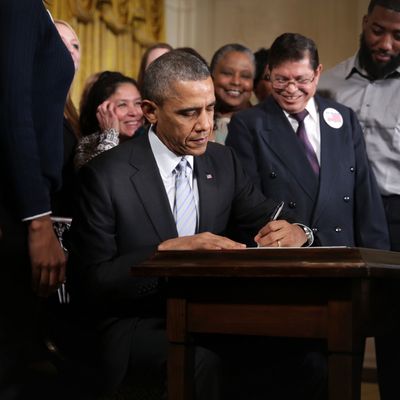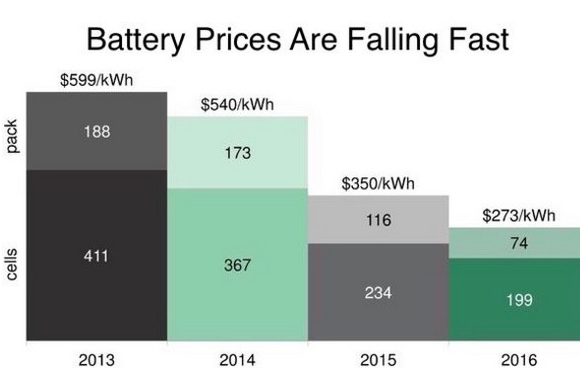
A major theme of my book, perhaps the central one, is that a fixation on all sides with fleeting short-term events obscured the breadth and depth of the transformative change wrought by the Obama administration. Large and even revolutionary policy changes received little attention because they were not attached to whatever political drama had captured the attention of the political media, and those “game-changing” dramas, in turn, frequently had little or no ultimate importance.
That same fixation with immediacy has continued to color our perception of Obama since he departed. Donald Trump’s election is the most compelling and immediate story in American politics, and correctly so, but its drama has caused Obama’s presidency to be refracted through the lens of Trump. What does Trump tell us about Obama? What does Obama tell us about Trump? The easy assumption since November has been that Trump would rapidly erase Obama’s legacy. “Obama’s legacy is toast,” gloated conservative commentators. That conclusion, reached immediately in the wake of the election, has continued to form the entirety of right-wing thought about Obama. Trump won, ergo, everything Obama did is gone, close the books.
Ben Domenech’s review of Audacity for National Review takes the premise that Obama’s legacy is toast as so obviously correct it requires no substantiation. Domenech begins with some mockery about how the book “arrive[d] just as its central thesis is dashed against the sharp rocks of reality,” and that it “has the unfortunate distinction of having gone on sale 72 hours before Donald J. Trump took the oath of office, rendering it utterly irrelevant as anything but a cultural artifact demonstrating the hubris of American liberalism.” From there Domenech pays little attention to the book’s argument that Obama accomplished large-scale change, and none whatsoever to its case that most of that change will likely survive Trump.
Domenech’s review was available online less than two weeks after Trump took the oath of office. It appears in the print edition of National Review, which means — given the schedule of print magazines — it was almost certainly written mostly or entirely before Trump took office, allowing Domenech’s argument to treat Trump’s imminent vanquishing of the Obama legacy as a certainty. But the events of the last month have already suggested a very different outcome.
Obama’s measures to prevent a second Great Depression after the 2008 financial crisis — the stimulus, the stress tests of the banks, and auto bailout — are safe from Trump by definition. The Dodd-Frank financial reforms will be temporarily weakened through lax enforcement, just as labor, environmental, campaign, and other regulations conservatives disapprove of are typically weakened during Republican administrations. But Republicans do not have anywhere close to the 60 votes they need to wipe Dodd-Frank off the books. Obama’s education reforms are likely safe as well.
Republicans promised Trump would immediately pull out of the Paris climate agreement and destroy Obama’s environmental strategy. But Trump hasn’t pulled out yet, a delay that implies he is at least considering the domestic and international blowback such a move would provoke. He has certainly handed out a series of favors to the fossil-fuel industry, the latest enabling American oil companies to bribe foreign governments. “We’re bringing back jobs, big league,” he announced. “We’re bringing them back at the plant level. We’re bringing them back at the mine level.”
But, as I argued in the book, both the green-energy revolution that Obama helped set out, and the international diplomatic consensus in favor of limiting climate change he helped assemble have a life of their own. Rather than use Trump’s election as an excuse to renege on their own commitments, world leaders insisted after the election their agreement was irreversible. Trump will slow down the pace of the green-energy transformation, but he has neither the inclination nor the ability to destroy the changes of the last eight years. Over the last few weeks, two of the largest coal-fired power plants have announced plans to shut down.
The Republican indictment of Obama’s energy policies revolved around the failure of Solyndra, a solar firm that received a $585 million loan as part of the $90 billion green-energy investment in the stimulus. Solyndra became a symbol of Obama’s alleged failure not because anything untoward took place to allow it to receive a loan — it was once considered a cutting-edge firm and had been selected for a smaller-scale loan under the Bush administration — but because other solar firms that also got support from the stimulus quickly out-innovated it. The old conservative mental image of green energy as an unaffordable hippie daydream is hopelessly quaint, in a world where the cost of solar has plunged 85 percent, and wind 66 percent, since the stimulus, and these technologies now produce energy for less than coal. Since 2008, wind power has more than quadrupled, and solar-power capacity has increased 4,000 percent.
Battery-storage technology is a crucial factor to the greening of both the electric power sector and the transportation sector. Affordable batteries are the key component to making electric cars cost-competitive with the gasoline-powered kind. And battery storage is an enormous factor in allowing renewable energy to completely displace fossil fuels. Solar and wind power can already generate electricity more cheaply than coal, but battery storage is necessary for those sources to replace the need for fossil-fuel power when the sun isn’t shining and the wind isn’t blowing. The price of advanced batteries has fallen by more than half in the last three years alone:

And the Republican notion that subsidizing an infant industry violates the principles of a free economy, and amounts to “crony capitalism,” has been utterly abandoned in the face of an administration where the president uses his office for self-enrichment and White House employees literally use their office to gin up customers for his family business.
And then there is Obamacare repeal, the Holy Grail of the quest to erase Obama’s legacy. My book argues that Obamacare will be difficult to repeal — by bringing 20 million previously uninsured Americans into the system, Republicans can no longer ignore them. Events since its publication have borne out that analysis. Republicans have promised to replace the law with a plan that has lower deductibles and premiums and better choices. A plan like that would require spending more money than Obamacare, and Republicans are coming face-to-face with the reality that there’s no mechanism to finance such a plan that their party could support. (Conservative intellectuals support cutting or eliminating the tax deduction for employer-sponsored insurance, which would work in theory, except it’s massively unpopular with voters, lobbyists, and members of Congress in both parties.) Financing the alternative plan is the largest obstacle facing Republicans, but hardly the only one. There are innumerable problems that must be resolved — whether to keep the Medicaid expansion, whether to defund Planned Parenthood, whether to repeal Obamacare’s taxes, and on and on. Republicans have to find near unanimity on every single one of them in order to pass a bill out of both chambers of Congress. They have resolved none of them so far.
Republicans in Congress have made no more progress in developing a partywide alternative in the three and a half months since the election than they made in the seven years before that. Their only options are to keep the current system, or some version thereof, or inflict cruelty upon millions and massive disruption to an industry that accounts for a fifth of the economy. “I would say it’s not that easy to repeal it,” concedes Representative Peter King. “The entire repeal is in mortal danger,” admits Representative Trent Franks.
Republican messaging heavily emphasized the notion that Obama governed largely through the issuing of executive orders, which supposedly left his agenda vulnerable to a quick reversal. Trump has illustrated how fallacious that notion was. The new president has issued a flurry of executive orders, but — with the exception of the immigration order, which was a fiasco — these orders have mostly been symbolic vehicles for communicating goals, rather than actual policy changes.
The notion that Obama’s presidency could and would be erased with a few strokes of the pen was a form of Republican propaganda that Republicans themselves came to believe. Conservatives took Trump’s grandiose rhetoric about repealing Obamacare and replacing it with something terrific, or bringing back coal jobs, at face value because they wanted to believe it. (Many despondent liberals yielded to the same conclusion out of characteristic fatalism.) But one of the lessons gained from a close study of Obama’s presidency, or any presidency, is that governing is hard. The reforms his domestic policies have wrought do not come easy. Even a highly competent Republican presidency would have difficulty unwinding them. And Trump has shown no signs so far of being even a minimally competent president. The expectation of a rapid erasure of Obama’s presidency looks like — to pick a cliché I read somewhere — hubris dashed against the sharp rocks of reality.






























